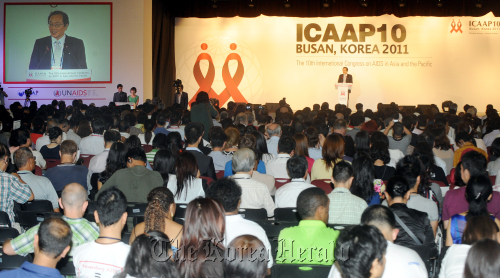Busan forum ICAAP10 seeking ways to wipe out stigma and prejudice
BUSAN ― Activists, medical researchers and other participants in an international forum on AIDS here called for more concerted global efforts to combat the disease and wipe out prejudice and stigma surrounding it.
The 10th International Congress on AIDS in Asia and the Pacific kicked off its five-day run at BEXCO in this southern port city on Friday with more than 2,500 people from 64 countries joining the biennial gathering.
BUSAN ― Activists, medical researchers and other participants in an international forum on AIDS here called for more concerted global efforts to combat the disease and wipe out prejudice and stigma surrounding it.
The 10th International Congress on AIDS in Asia and the Pacific kicked off its five-day run at BEXCO in this southern port city on Friday with more than 2,500 people from 64 countries joining the biennial gathering.

With the main theme of “Diverse Voices, United Action,” the world’s second largest forum on HIV/AIDS drew more global attention than ever as it marks the 30th year since the first case of AIDS was identified in the U.S.
“In the beginning, AIDS was regarded as an incurable disease due to its high death rate and contagious nature. But with the development of medical technology and medications, it is now perceived as a manageable chronic illness,” Health Minister Chin Soo-hee said during the opening ceremony.
“I believe that international joint responses and cooperation are more crucial for this disease than for other ones. Your attention and efforts will become a cornerstone in the endeavors to address all issues concerning the illness.”
Among high-profile participants are Fiji President Ratu Epeli Nailatikau, UNAIDS executive director Michel Sidibe, U.N. Special Envoy for HIV/AIDS in Asia and the Pacific Nafis Sadik, WHO Western Pacific regional director Shin Young-soo and Australian Ambassador for HIV Murray Proctor.
“HIV is treatable. But there are challenges to achieving universal access to prevention, treatment and care. Those challenges are political, financial, logistical, legal, social, and cultural,” Shin Young-soo said in his congratulatory remarks.
“It remains a sad fact that whether we talk about vulnerable populations or the wider population, HIV remains cloaked in stigma and discrimination. We need to listen more closely to the voices of people vulnerable to HIV and people living with HIV.”
Ursula Schaefer-Preuss, vice president of the Knowledge Management and Sustainable Development at Asian Development Bank, also stressed the need to intensify joint efforts to fight the disease.
“By working together as governments, civil society, affected populations, the private sector and faith-based communities ― and by maximizing our resources, connections and influence ― we make a positive impact on this epidemic,” she said.
The forum consists of five plenary sessions, 47 oral presentations, 11 symposia, 24 satellite meetings and 25 skill-building workshops. Around 1,000 posters on AIDS will also be presented during the conference.
These meetings will delve deep into wide-ranging issues such as the human rights of AIDS patients, legal issues for them, progress in AIDS treatment, measures to wipe out social stigma and misconceptions, and civil society engagement.
Also on the first day of the forum, UNAIDS appointed a Korean pop group JYJ as its regional goodwill ambassadors, who will work to raise HIV awareness and speak out against AIDS-related stigma and discrimination.
UNAIDS co-hosting the forum is a U.N. partnership that leads efforts to achieve universal access to HIV prevention, treatment, care and support. Last week, JYJ were appointed as “official ambassadors” for ICAAP10.
Prior to the opening ceremony, key participants reaffirmed their commitment to joint, global responses to the disease during the AIDS Champions Meeting, a platform to discuss ongoing challenges facing affected communities.
In their closing statement at the meeting, regional leaders from governments, parliaments, civic groups and private sectors called for more efforts to tear down the barriers which limit access to HIV prevention, treatment, care and support.
They particularly focused on giving high-level support to help address a series of issues concerning “key affected populations” such as sex workers, injecting drug users, homosexuals and transgender populations.
By Song Sang-ho (sshluck@heraldcorp.com)










![[Today’s K-pop] BTS pop-up event to come to Seoul](http://res.heraldm.com/phpwas/restmb_idxmake.php?idx=644&simg=/content/image/2024/04/17/20240417050734_0.jpg&u=)
![[Graphic News] More Koreans say they plan long-distance trips this year](http://res.heraldm.com/phpwas/restmb_idxmake.php?idx=644&simg=/content/image/2024/04/17/20240417050828_0.gif&u=)




![[KH Explains] Hyundai's full hybrid edge to pay off amid slow transition to pure EVs](http://res.heraldm.com/phpwas/restmb_idxmake.php?idx=652&simg=/content/image/2024/04/18/20240418050645_0.jpg&u=20240419100350)

